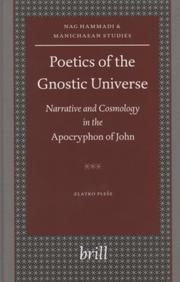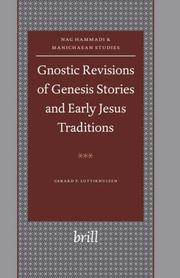| Listing 1 - 10 of 10 |
Sort by
|
Book
ISBN: 9783447115995 3447115998 Year: 2021 Publisher: Wiesbaden Harrassowitz
Abstract | Keywords | Export | Availability | Bookmark
 Loading...
Loading...Choose an application
- Reference Manager
- EndNote
- RefWorks (Direct export to RefWorks)
Die gnostische Religionsgemeinschaft der Mandäer, ursprünglich im Südirak beheimatet, steht in Verbindung mit Judentum, Christentum und Islam. Gleiche und ähnliche Überlieferungen werden aufgenommen und auf eigene Weise interpretiert und fortgeschrieben. Das Johannesbuch der Mandäer enthält neben Traditionen über Sem, den Sohn Noahs, und Maria (Mirjam) auch einen Traktat über Johannes den Täufer. Johannes wird hier als der einzig wahre Prophet dargestellt, der auch Sieger im Disput mit Jesus Christus bleibt. Dem Traktat zufolge soll die mandäische Religion das Judentum als weithin gültige Religion ablösen und sich auch gegenüber dem Christentum durchsetzen. Die Ausbreitung des Islams hingegen, mit der die Mandäer Bedrängnis, Verfolgung und Not, gar einen Vorboten des Weltuntergangs assoziieren, erscheint sowohl im Johannesbuch als auch im Ginza als teils schon gegenwärtig, wird teils aber auch als zukünftig prophezeit.Gabriele Mayer liefert neben einer Neuübersetzung des Traktats eine detaillierte Auseinandersetzung mit dem Text. Neben Ausführungen zur Metrik und der poetischen Struktur der Texte enthält ihre Darstellung Bemerkungen zu Textkritik und Übersetzung sowie einen Kommentar zu den behandelten Abschnitten. Zur Erläuterung werden sowohl andere mandäische Texte sowie Texte aus dem religionsgeschichtlichen Umfeld herangezogen, um so die Einzigartigkeit der mandäischen Tradition herauszuarbeiten.
Mandaeism --- John, --- Book of John --- Criticism, interpretation, etc.

ISBN: 0674039602 9780674039605 9780674030558 0674030559 0674019032 0674265122 Year: 2009 Publisher: Cambridge, Mass. : Harvard University Press,
Abstract | Keywords | Export | Availability | Bookmark
 Loading...
Loading...Choose an application
- Reference Manager
- EndNote
- RefWorks (Direct export to RefWorks)
Karen L. King offers an illuminating reading of this ancient text, said to be Christ's revelation to his disciple John. In her analysis, the Revelation becomes a comprehensible religious vision--and a window on the religious culture of the Roman Empire. A translation of the complete Secret Revelation of John is included.
Christian literature, Early --- History and criticism. --- Apocryphon of John --- Apocalypse of John (Gnostic) --- Secret book of John --- Secret revelation to John --- Apocryphon Johannis --- Criticism, interpretation, etc. --- Bible --- Critique et exégèse.
Book
ISBN: 9783110835663 3110835665 3110065029 Year: 1966 Publisher: [Berlin : A. Topelmann,
Abstract | Keywords | Export | Availability | Bookmark
 Loading...
Loading...Choose an application
- Reference Manager
- EndNote
- RefWorks (Direct export to RefWorks)
Keine ausführliche Beschreibung für "Das Johannesbuch der Mandäer" verfügbar.
Mandaeans. --- Christians of Saint John --- Christians of St. John --- Disciples of Saint John --- Mendaeans --- Nasoraeans --- Sabaeans (Mandaeans) --- Sabians --- Saint John's Christians --- St. John's Christians --- Subbiyuns --- Religious adherents --- Book of John.

ISBN: 9004116745 9789004116740 9786611384333 128138433X 9047404025 9789047404026 9789047404026 9781281384331 Year: 2006 Volume: 52 Publisher: Leiden ; Boston : Brill,
Abstract | Keywords | Export | Availability | Bookmark
 Loading...
Loading...Choose an application
- Reference Manager
- EndNote
- RefWorks (Direct export to RefWorks)
This volume is both an essay in Gnostic poetics and a study in the history of early Christian appropriation of ancient philosophy. The object of study is the cosmological model of the Apocryphon of John , a first-hand and fully narrated version of the Gnostic myth. The author examines his target text against a complex background of religious and philosophical systems, literary theories, and rhetorical techniques of the period, and argues that the world model of the Apocryphon of John is inseparable from the epistemological, theological, and aesthetic debates within contemporary Platonism. Poetics of the Gnostic Universe also discusses the composition and narrative logic of the Apocryphon of John , explores its revisionist attitude towards various literary models (Plato’s Timaeus , Wisdom literature, Genesis), and analyzes its peculiar discursive strategy of conjoining seemingly disconnected symbolic ‘codes’ while describing the derivation of a multi-layered universe from a single transcendent source.
Bible --- Criticism, interpretation, etc. --- Apocryphon of John --- Criticism, interpretation, etc --- 273.1*35 --- 273.1*35 Gnosis: Koptische bronnen: Nag Hammadi; Codex Jung; Evangelium veritatis --- Gnosis: Koptische bronnen: Nag Hammadi; Codex Jung; Evangelium veritatis --- Apocalypse of John (Gnostic) --- Secret book of John --- Secret revelation to John --- Apocryphon Johannis

ISSN: 09292470 ISBN: 9004145109 9047417054 9789004145108 9789047417057 Year: 2006 Volume: 58 Publisher: Leiden: Brill,
Abstract | Keywords | Export | Availability | Bookmark
 Loading...
Loading...Choose an application
- Reference Manager
- EndNote
- RefWorks (Direct export to RefWorks)
This book argues that the intellectuals behind early Gnostic revisions of Genesis stories were second-century Christians with an ideological background in Greek-Hellenistic philosophy, who adopted and reinterpreted biblical narrative materials with a view to exposing the inferiority of the creator-God of Genesis and the ignorance of those Christians who continued to worship this God. It also discusses controversies between Gnostic and early orthodox Christians about the person and the mission of Jesus Christ. The first part examines the possible polemical function, the philosophical thought structure, and the narrative scheme of the Genesis rewritings, and continues with studies of individual episodes of the Gnostic myth, from the creation of Adam up to the story of Noah and the Flood. The second part focuses on Gnostic reinterpretations of the teaching and the passion of Jesus. The book includes essays about Gnostic theology, ancient and modern readings of Gnostic texts, and an appendix dealing with the ancient baptist community in which Mani was reared.
273.1*1 --- 273.1*1 Gnosis en Bijbel --- Gnosis en Bijbel --- Relation to the Old Testament. --- Apocryphon of John --- Gnostic literature --- Gnosticism. --- Criticism, interpretation, etc. --- Gnosticism --- Relation to the Old Testament --- Apocalypse of John (Gnostic) --- Secret book of John --- Secret revelation to John --- Apocryphon Johannis --- Criticism, interpretation, etc --- Cults --- Gnostic literature - Relation to the Old Testament.

ISBN: 0674019032 9780674019034 0674030559 0674039602 0674265122 Year: 2006 Publisher: Cambridge, Mass. : Harvard University Press,
Abstract | Keywords | Export | Availability | Bookmark
 Loading...
Loading...Choose an application
- Reference Manager
- EndNote
- RefWorks (Direct export to RefWorks)
Karen L. King offers an illuminating reading of this ancient text, said to be Christ's revelation to his disciple John. In her analysis, the Revelation becomes a comprehensible religious vision--and a window on the religious culture of the Roman Empire. A translation of the complete Secret Revelation of John is included.
Apocryphon of John --- Criticism, interpretation, etc. --- 229*44 --- 229*44 Apocriefe apocalypsen van Johannes, Maria, Paulus, Petrus, Thomas en Stephanus, Zozimus --- Apocriefe apocalypsen van Johannes, Maria, Paulus, Petrus, Thomas en Stephanus, Zozimus --- Apocalypse of John (Gnostic) --- Secret book of John --- Secret revelation to John --- Apocryphon Johannis --- Bible --- Critique et exégèse. --- Christian literature, Early --- History and criticism.
Book
ISBN: 0271093692 Year: 2022 Publisher: University Park, PA : Penn State University Press,
Abstract | Keywords | Export | Availability | Bookmark
 Loading...
Loading...Choose an application
- Reference Manager
- EndNote
- RefWorks (Direct export to RefWorks)
Opulent jeweled objects ranked among the most highly valued works of art in the European Middle Ages. At the same time, precious stones prompted sophisticated reflections on the power of nature and the experience of mineralized beings. Beyond a visual regime that put a premium on brilliant materiality, how can we account for the ubiquity of gems in medieval thought?In The Mineral and the Visual, art historian Brigitte Buettner examines the social roles, cultural meanings, and active agency of precious stones in secular medieval art. Exploring the layered roles played by gems in aesthetic, ideological, intellectual, and economic practices, Buettner focuses on three significant categories of art: the jeweled crown, the pictorialized lapidary, and the illustrated travel account. The global gem trade brought coveted jewels from the Indies to goldsmiths' workshops in Paris, fashionable bodies in London, and the crowns of kings across Europe, and Buettner shows that Europe's literal and metaphorical enrichment was predicated on the importation of gems and ideas from Byzantium, the Islamic world, Persia, and India.Original, transhistorical, and cross-disciplinary, The Mineral and the Visual engages important methodological questions about the work of culture in its material dimension. It will be especially useful to scholars and students interested in medieval art history, material culture, and medieval history.
Albert the Great. --- Alfonso X el Sabio. --- Book of John Mandeville. --- Charles IV (Holy Roman Emperor). --- Constantine the Great. --- Marbode of Rennes. --- Marco Polo. --- Pliny the Elder. --- Prester John. --- coronations. --- crowns. --- history of mineralogy. --- lapidaries. --- materiality in art. --- medieval art. --- medieval trade. --- travel literature.
Book
ISBN: 3161529839 9783161529832 Year: 2017 Volume: 441 Publisher: Tübingen: Mohr Siebeck,
Abstract | Keywords | Export | Availability | Bookmark
 Loading...
Loading...Choose an application
- Reference Manager
- EndNote
- RefWorks (Direct export to RefWorks)
David Creech explores at length the Apocryphon of John's ambivalent treatment of the Jewish and Christian scriptures. Although Moses is explicitly corrected at five points in the text, Genesis' account of creation is nonetheless the basis for the Apocryphon's cosmogony and anthropogony. Its uneven treatment of the biblical text is the result of a dispute between the authors of the Apocryphon and other early Catholics. At the earliest stage of the text the Christians who wrote and read the Apocryphon worshiped alongside other early catholic Christians without any sense of contradiction or inconsistency. The key shift in the Apocryphon occurred after Irenaeus of Lyons' assault on “Knowledge Falsely So-Called.” In response to his concerted effort to bring the church under the authority of early catholic bishops, the framers inserted corrections to Moses. The corrections are primarily rhetorical and used to refute early catholic identity markers.
229*42 --- 229*42 Apocriefe handelingen der apostelen van Andreas, Barnabas, Philippus, Jacobus, Johannes, Matthaeus, Paulus, Petrus, Pilatus, Thomas, Paulus en Thecla, Petrus en Paulus --- Apocriefe handelingen der apostelen van Andreas, Barnabas, Philippus, Jacobus, Johannes, Matthaeus, Paulus, Petrus, Pilatus, Thomas, Paulus en Thecla, Petrus en Paulus --- Apocryphon of John --- Apocalypse of John (Gnostic) --- Secret book of John --- Secret revelation to John --- Apocryphon Johannis --- Criticism, interpretation, etc.
Book
ISBN: 3727806060 Year: 1989 Publisher: Freiburg Universitätsverlag
Abstract | Keywords | Export | Availability | Bookmark
 Loading...
Loading...Choose an application
- Reference Manager
- EndNote
- RefWorks (Direct export to RefWorks)
Gnosticism --- Stoics --- 273.1*35 --- Ethics --- Philosophy, Ancient --- Cults --- 273.1*35 Gnosis: Koptische bronnen: Nag Hammadi; Codex Jung; Evangelium veritatis --- Gnosis: Koptische bronnen: Nag Hammadi; Codex Jung; Evangelium veritatis --- Apocryphon of John --- Nag Hammadi codices. --- Nag Hammadi library --- Chenoboskion manuscripts --- Nag Hammadi manuscripts --- Khenoboskion manuscripts --- Najʻ Ḥammādī texts --- Nag Hammadi texts --- Apocalypse of John (Gnostic) --- Secret book of John --- Secret revelation to John --- Apocryphon Johannis --- Criticism, interpretation, etc. --- Bible
Book
ISBN: 9780691176086 0691176086 1400866359 Year: 2017 Publisher: Princeton : Princeton University Press,
Abstract | Keywords | Export | Availability | Bookmark
 Loading...
Loading...Choose an application
- Reference Manager
- EndNote
- RefWorks (Direct export to RefWorks)
From the turn of the fifth century to the beginning of the eighteenth, Christian writers were fascinated and troubled by the "Problem of Paganism," which this book identifies and examines for the first time. How could the wisdom and virtue of the great thinkers of antiquity be reconciled with the fact that they were pagans and, many thought, damned? Related questions were raised by encounters with contemporary pagans in northern Europe, Mongolia, and, later, America and China. Pagans and Philosophers explores how writers--philosophers and theologians, but also poets such as Dante, Chaucer, and Langland, and travelers such as Las Casas and Ricci--tackled the Problem of Paganism. Augustine and Boethius set its terms, while Peter Abelard and John of Salisbury were important early advocates of pagan wisdom and virtue. University theologians such as Aquinas, Scotus, Ockham, and Bradwardine, and later thinkers such as Ficino, Valla, More, Bayle, and Leibniz, explored the difficulty in depth. Meanwhile, Albert the Great inspired Boethius of Dacia and others to create a relativist conception of scientific knowledge that allowed Christian teachers to remain faithful Aristotelians. At the same time, early anthropologists such as John of Piano Carpini, John Mandeville, and Montaigne developed other sorts of relativism in response to the issue. A sweeping and original account of an important but neglected chapter in Western intellectual history, Pagans and Philosophers provides a new perspective on nothing less than the entire period between the classical and the modern world.
Paganism --- Paganism. --- Philosophy and religion. --- Philosophy --- Philosophy. --- History. --- Civilization, Pagan --- Heathenism --- Religions --- Christianity and philosophy --- Religion and philosophy --- Religion --- Acts of the Apostles. --- America. --- Anicius Manlius Severinus Boethius. --- Aristotelians. --- Aristotle. --- Arts Faculties. --- Asia. --- Augustine of Hippo. --- Augustine. --- Boethius. --- China. --- Chinese philosophers. --- Chinese religion. --- Christian Europe. --- Christian belief. --- Christian teachers. --- Christianity. --- Christianization. --- City of God. --- Collationes. --- Consolation of Philosophy. --- Dante Alighieri. --- Early Middle Ages. --- English poets. --- Entheticus de dogmate philosophorum. --- Epicurus. --- Europe. --- Geoffrey Chaucer. --- Giovanni Boccaccio. --- Gottfried Willhelm Leibniz. --- Hell. --- Historical Synthesis. --- John of Piano Carpini. --- John of Salisbury. --- Long Middle Ages. --- Middle Ages. --- Mongols. --- Peter Abelard. --- Policraticus. --- Problem of Paganism. --- Roman history. --- The Book of John Mandeville. --- Theologia Christiana. --- Theologia Summi Boni. --- University of Oxford. --- University of Paris. --- Western Europe. --- Willehalm. --- William Langland. --- William of Rubruk. --- ancient models and language. --- ancient paganism. --- ancient pagans. --- classical antiquity. --- contemporary pagans. --- early medieval scholars. --- encyclopaedic tradition. --- higher education. --- humanism. --- knowledge. --- modernity. --- pagan culture. --- pagan knowledge. --- pagan salvation. --- pagan society. --- pagan virtue. --- pagan wisdom. --- paganism. --- pagans. --- philosophy. --- relativism. --- sack of Rome. --- salvation. --- theological challenges. --- theological problems. --- theoretical developments. --- universities. --- university theologians. --- unknown pagan peoples. --- virtue. --- virtuous pagans. --- wisdom.
| Listing 1 - 10 of 10 |
Sort by
|

 Search
Search Feedback
Feedback About UniCat
About UniCat  Help
Help News
News